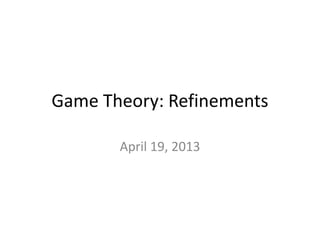
041913
- 1. Game Theory: Refinements April 19, 2013
- 2. Announcements • Homework 3 is due before class on Monday • Next week we’ll begin talking about externalities
- 3. Last Class • Considered more example of Nash equilibria and strictly dominant strategies • Played a game: Write down ½ of the average of others’ guesses. Choose from [0,100]. – Nash equilibrium: Everyone writes down zero
- 4. How did we solve this problem? • If everyone guessed 100, the best number to write down (best response!) would be 50. • But if everyone wrote 50, the BR is 25. • If all 25, BR is 12.5, … etc • If all 0, BR is 0. Only Nash Equilibrium • This iterative process for finding equilibrium is a ``refinement’’ of Nash equilibrium.
- 5. Refinements • Extensions of the basic version of Nash Equilibrium we have seen. • The game we played demonstrates a concept called iterated dominance. • Another refinement has to do with the timing of the game; called sequential rationality.
- 6. Games in Which Timing Matters Opening a New Restaurant Bill Dinner Breakfast Alice Dinner $1000 (A) $1000 (B) $1600 (A) $1400 (B) Breakfast $1400 (A) $1600 (B) $800 (A) $800 (B) Alice and Bill are each considering opening a restaurant in their local neighborhood . . . But what kind?
- 7. Decision Tree & Backward Induction Bill Decides Alice Decides Outcome D D D B B B $1000 (A) $1000 (B) $1600 (A) $1400 (B) $1400 (A) $1600 (B) $800 (A) $800 (B)
- 8. A. To Bed, Tantrum B. To Bed, Not Tantrum C. Not to Bed, Tantrum D. Not to Bed, Not Tantrum
- 9. Games in Which Timing Matters Opening a Convenience Store Freeway 1 mile 1,200 people A B C ⅓ mile 400 people ⅓ mile 400 people ⅓ mile 400 people 1 mile 1,200 people Store A opens first . . . Where should the owner of a second convenience store choose to locate? Monopolistic competition
- 10. Tendency for Monopolistic Competitors to Cluster Hotelling’s (1929) insights help explain • Why convenience stores and gas stations are often clustered on the same corner. • Why political candidates often “moderates”. • Why Coca-Cola and Pepsi are so similar. • Why Kellogg’s and Post both have purple raisin bran boxes.
- 11. Commitment Problems • In many of the games we’ve looked at players cannot achieve the desired outcome because of a commitment problem— that is they cannot make credible threats or promises about their future actions. • Sometimes, it’s possible to adopt commitment devices ‒ Omerta: anyone who testifies against a fellow mob member is killed. ‒ Legally binding contracts ‒ Commissions to salespeople
- 12. Commitment Problems • Sometimes we want to commit ourselves . . . – Bring a fixed amount of cash when you go out. – Leave your laptop at work so you don’t work from home. – Brush your teeth to avoid snacking later. – Cut up your credit cards.
- 13. Commitment Problems • Sometimes psychological incentives can solve commitment problems – Guilt – Sympathy towards others
- 14. Stranger A Give $ Keep the $ Don’t Give $ Buy Tacos -20 for you 20 for the stranger 5 for you 10 for stranger 0 for you 0 for stranger You’re hungry but too busy to go buy lunch, so you give a stranger $20 to go buy you two fish tacos (which you value at $25). A. Give, Keep B. Give, Buy C. Don’t give
- 15. Stranger A Give $ Keep the $ Don’t Give $ Buy Tacos -20 for you -10 for your friend 5 for you 10 for your friend 0 for you 0 for your friend You’re hungry but too busy to go buy lunch, so you give your best friend $20 to go buy you two fish tacos (which you value at $25). A. Give, Keep B. Give, Buy C. Don’t Give
- 16. Lesson • Having a trustworthy trading partner can make both parties better off. • The hard part is identifying people who you can trust. • Reputation matters.
- 17. Splitting a cake Donnie Marie 50/50 >.5 Big/Small <.5 0.5 (D) 0.5 (M) <0.5 (D) >0.5 (M) >0.5 (D) <0.5 (M)